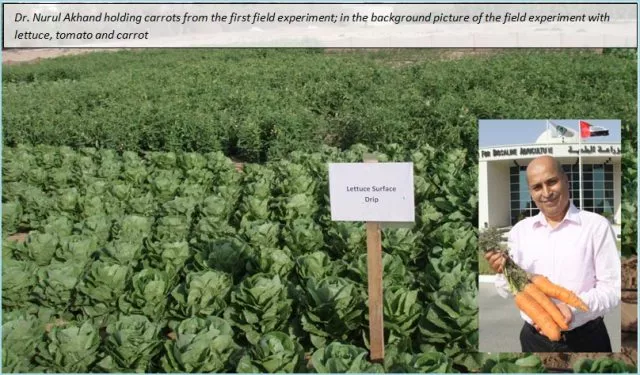ICBA Management Reviews Progress of Internally Funded Research Projects
19 June 2013
In 2012, the International Center for Biosaline Agriculture (ICBA) identified and funded 20 research projects to serve as seed to leverage larger scale projects with partners.
After six months, project leaders shared updates with management and their peers and discussed the next steps in their research. Dr. Mohammed Amrani, Director of Research and Innovation at ICBA, said, “It was a very good exercise because it helped scientists to share their work and achievements as well as make adjustments if any in the next stages of the implementation. In addition, it proved to be an opportunity to foster collaboration and integration amongst the projects.”
One of the projects that have shown promising results is the use of treated municipal wastewater to irrigate vegetables. Dr. Nurul Akhand, Irrigation Management Scientist at ICBA, is the project leader and reported that he and his team have successfully completed the first trial of the project growing vegetables using tertiary level treated wastewater, received from the Dubai Municipality. “Lab results are very promising in regards to growing vegetables (such as tomato, lettuce, and carrots) with treated wastewater” says Dr. Akhand “we will continue the research over the next two years to reach more conclusive results including not only vegetables but Buffel Grass (forage crop), “Miswak” (landscaping plant), and date palm (fruit tree)”.
A project that received a great deal of interest from partners is one investigating the importance, feasibility and use of municipal waste compost. A thorough analysis of the nutrient value and organic content of waste compost from four facilities in the UAE has been completed. The results of an incubation study on dynamics and nutrients availability is now underway with greenhouse and field trials scheduled for the remainder of the project period. “If this initial model succeeds into getting solid results from the first phase then we could apply it for the rest of the Gulf countries,” said the project leader Dr Abdullah Alshankiti, Senior Soil Management Scientist. Dr Alshankiti added, “I would like to emphasis the importance of using seed money in internal projects. In fact, my project attracted private sector partners and now we are working on developing a “Sludge Valorization Feasibility Study” in partnership with Ajman Sewerage”.
As ICBA launches its new strategy, its guiding principles are innovation, partnership, and excellence to deal with challenges in marginal environments.











